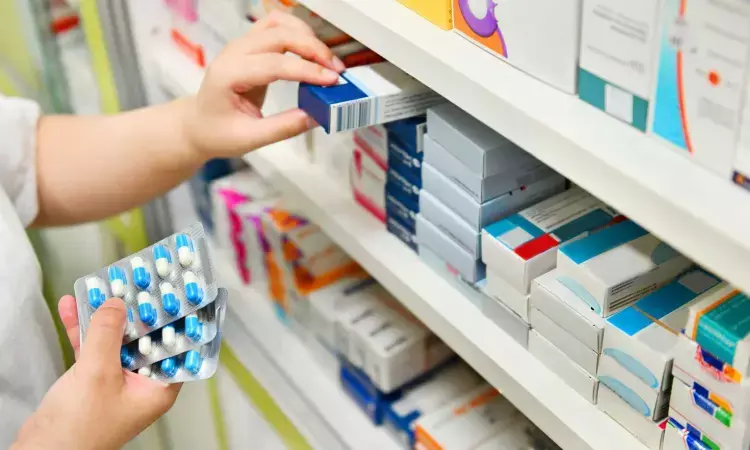- Home
- Medical news & Guidelines
- Anesthesiology
- Cardiology and CTVS
- Critical Care
- Dentistry
- Dermatology
- Diabetes and Endocrinology
- ENT
- Gastroenterology
- Medicine
- Nephrology
- Neurology
- Obstretics-Gynaecology
- Oncology
- Ophthalmology
- Orthopaedics
- Pediatrics-Neonatology
- Psychiatry
- Pulmonology
- Radiology
- Surgery
- Urology
- Laboratory Medicine
- Diet
- Nursing
- Paramedical
- Physiotherapy
- Health news
- Fact Check
- Bone Health Fact Check
- Brain Health Fact Check
- Cancer Related Fact Check
- Child Care Fact Check
- Dental and oral health fact check
- Diabetes and metabolic health fact check
- Diet and Nutrition Fact Check
- Eye and ENT Care Fact Check
- Fitness fact check
- Gut health fact check
- Heart health fact check
- Kidney health fact check
- Medical education fact check
- Men's health fact check
- Respiratory fact check
- Skin and hair care fact check
- Vaccine and Immunization fact check
- Women's health fact check
- AYUSH
- State News
- Andaman and Nicobar Islands
- Andhra Pradesh
- Arunachal Pradesh
- Assam
- Bihar
- Chandigarh
- Chattisgarh
- Dadra and Nagar Haveli
- Daman and Diu
- Delhi
- Goa
- Gujarat
- Haryana
- Himachal Pradesh
- Jammu & Kashmir
- Jharkhand
- Karnataka
- Kerala
- Ladakh
- Lakshadweep
- Madhya Pradesh
- Maharashtra
- Manipur
- Meghalaya
- Mizoram
- Nagaland
- Odisha
- Puducherry
- Punjab
- Rajasthan
- Sikkim
- Tamil Nadu
- Telangana
- Tripura
- Uttar Pradesh
- Uttrakhand
- West Bengal
- Medical Education
- Industry
GLP-1 agonists reduce risk of Stroke and provide neuroprotection to diabetes patients

Neuroprotective effects of glucagon-like peptide-1 (GLP-1) agonists and dipeptidyl peptidase-4 (DPP-4) inhibitors are independent of glycemic control, says an article published in Journal of Diabetes and its Complications.
Stroke accounts for 11.6% of all fatalities globally, making it the second leading cause of death. In 2019, there were about 6.55 million stroke-related fatalities, 12.2 million incident cases, and 101 million prevalent cases. Stroke risk is often increased in diabetic patients. In recent years, new glucose-lowering medications have been launched, and randomized controlled trials (RCTs) have shown the varied effects of these medications on cardiovascular end events. Jiaxi Li and his colleagues did a meta-analysis to incorporate these trials, which employed SGLT-2 inhibitors, GLP-1 agonists, or DPP-4 inhibitors in the experimental group and placebo in the control group to evaluate the influence on the risk of stroke in people with type 2 diabetes.
Studies having stroke as an outcome event up to 3 December 2021 were found through searches of the Embase, Cochrane Library, and PubMed databases. A fixed-effects model was used to examine risk ratios for outcomes related to stroke.
The key findings of this study were:
19 RCTs involving 155 027 type 2 diabetic individuals were discovered.
According to a pooled analysis, GLP-1 agonists decreased total stroke (RR = 0.84, 95%CI 0.77-0.93, P = 0.000, I2 = 0%) and non-fatal stroke (RR = 0.85, 95%CI 0.77-0.94, P = 0.002, I2 = 0%) by 16% and 15%, respectively, compared to placebo.
Neither SGLT-2 inhibitors nor DPP-4 inhibitors were substantially linked to a reduced risk of stroke.
In conclusion, if GLP-1 agonists are to be utilized to lower the risk of stroke in people with type 2 diabetes, more research is required. Additionally, more study is required to determine how various stroke subtypes are affected by novel glucose-lowering medications.
Reference:
Li, J., Ji, C., Zhang, W., Lan, L., & Ge, W. (2023). Effect of new glucose-lowering drugs on stroke in patients with type 2 diabetes: A systematic review and Meta-analysis. In Journal of Diabetes and its Complications (Vol. 37, Issue 1, p. 108362). Elsevier BV. https://doi.org/10.1016/j.jdiacomp.2022.108362
Neuroscience Masters graduate
Jacinthlyn Sylvia, a Neuroscience Master's graduate from Chennai has worked extensively in deciphering the neurobiology of cognition and motor control in aging. She also has spread-out exposure to Neurosurgery from her Bachelor’s. She is currently involved in active Neuro-Oncology research. She is an upcoming neuroscientist with a fiery passion for writing. Her news cover at Medical Dialogues feature recent discoveries and updates from the healthcare and biomedical research fields. She can be reached at editorial@medicaldialogues.in
Dr Kamal Kant Kohli-MBBS, DTCD- a chest specialist with more than 30 years of practice and a flair for writing clinical articles, Dr Kamal Kant Kohli joined Medical Dialogues as a Chief Editor of Medical News. Besides writing articles, as an editor, he proofreads and verifies all the medical content published on Medical Dialogues including those coming from journals, studies,medical conferences,guidelines etc. Email: drkohli@medicaldialogues.in. Contact no. 011-43720751


